Professional Communication: Methods for Communicating with Schizophrenia Patients
VerifiedAdded on 2023/06/10
|7
|1541
|395
AI Summary
This report discusses the potential barriers with communication and appropriate communication methods for treating patients with schizophrenia. It covers topics such as listening actively, acknowledging the patient's experience, making clear diagnosis, proper medication, proper information and support, and recommendations. The report emphasizes the importance of good communication from healthcare practitioners towards people suffering from schizophrenia.
Contribute Materials
Your contribution can guide someone’s learning journey. Share your
documents today.
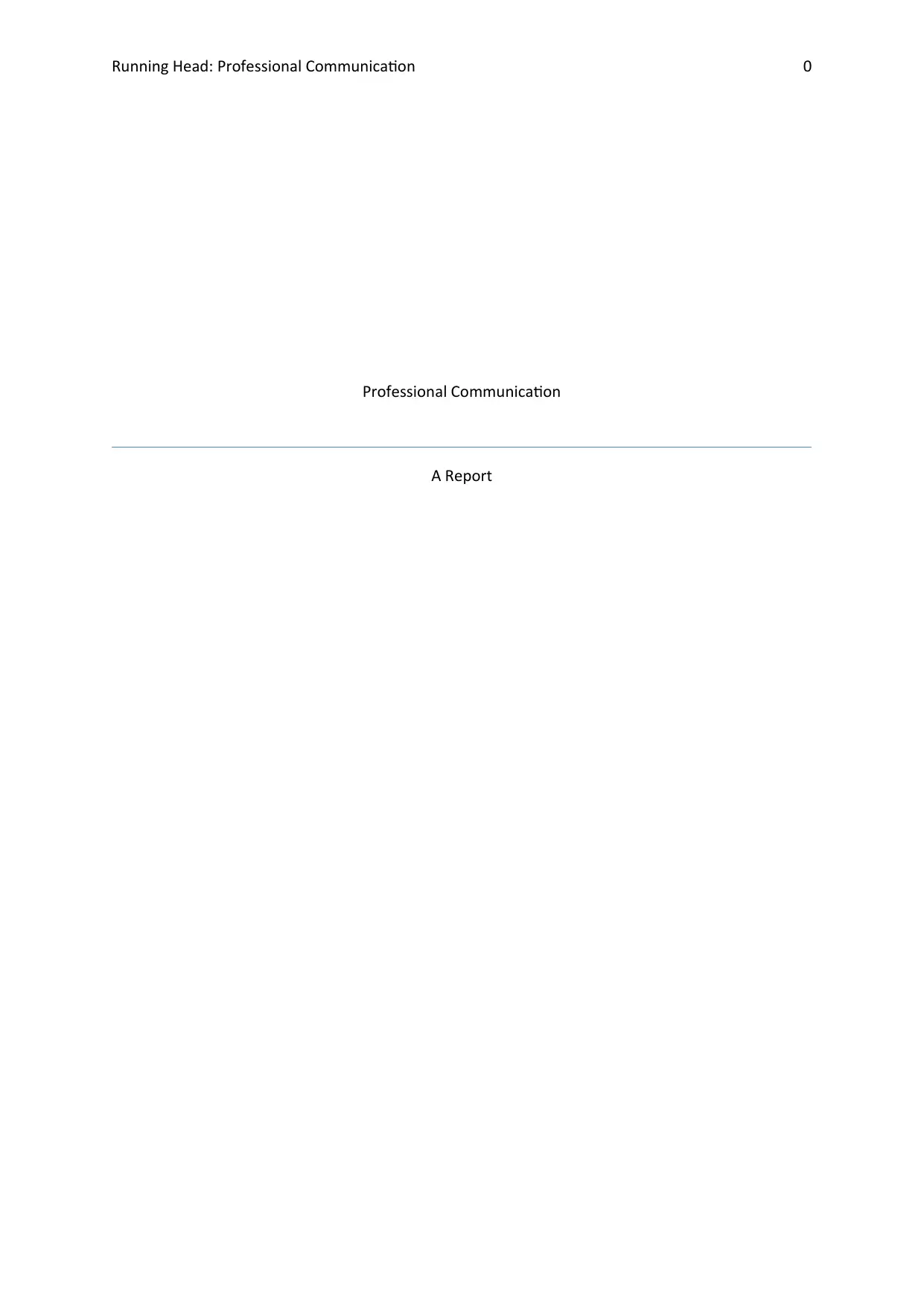
Running Head: Professional Communication 0
Professional Communication
A Report
Professional Communication
A Report
Secure Best Marks with AI Grader
Need help grading? Try our AI Grader for instant feedback on your assignments.

Professional communication 1
Executive Summary
Schizophrenia is a mental disorder in which a person feels delusions, hallucinations and
behaviour change. They feel isolated and lonely and they become very difficult to talk to. They do
not share their feelings easily. One has to be very patient and calm while treating such patients. In
this report, some methods have been shown which can be used by the professionals while
communicating with people suffering from schizophrenia.
Executive Summary
Schizophrenia is a mental disorder in which a person feels delusions, hallucinations and
behaviour change. They feel isolated and lonely and they become very difficult to talk to. They do
not share their feelings easily. One has to be very patient and calm while treating such patients. In
this report, some methods have been shown which can be used by the professionals while
communicating with people suffering from schizophrenia.
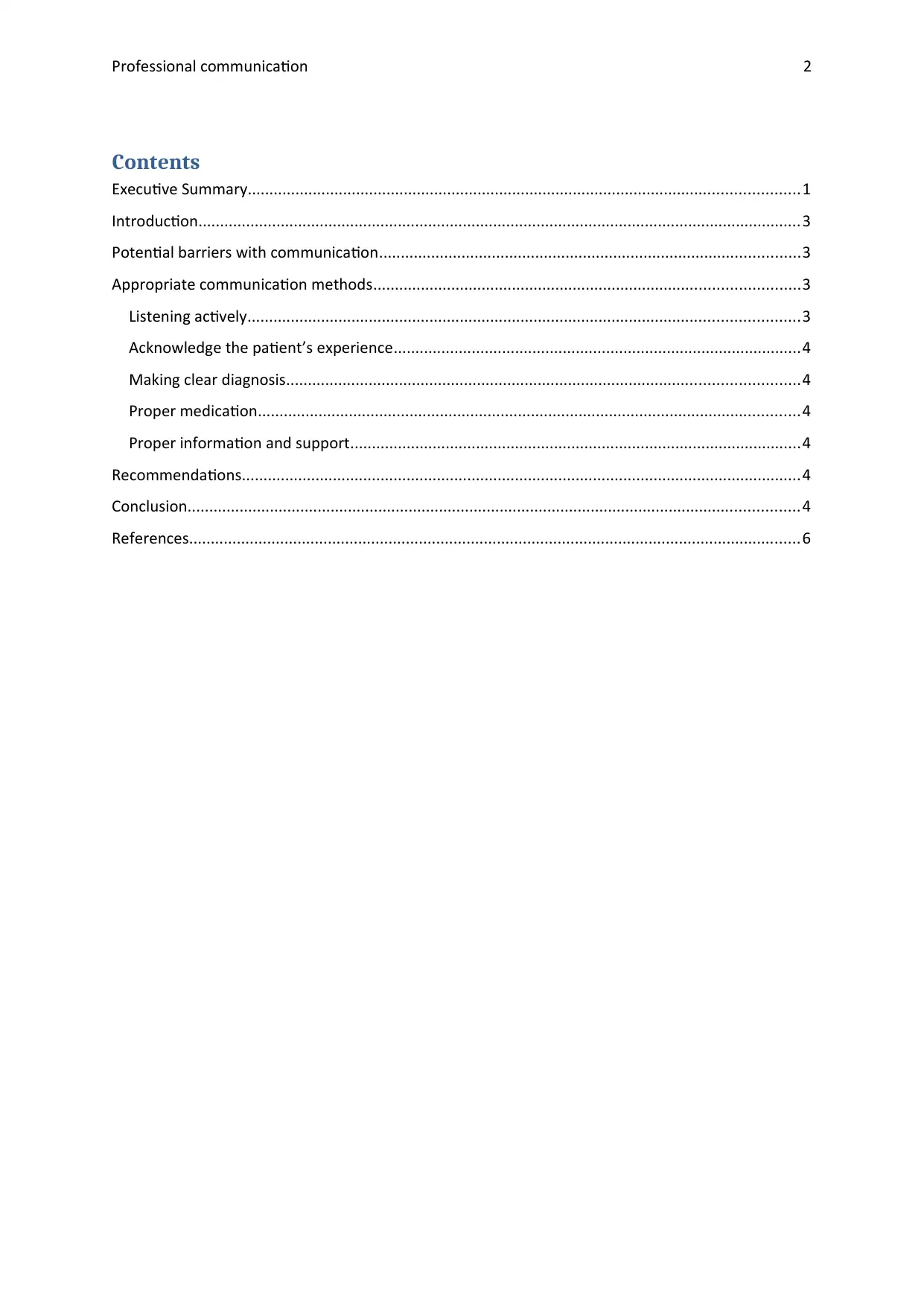
Professional communication 2
Contents
Executive Summary...............................................................................................................................1
Introduction...........................................................................................................................................3
Potential barriers with communication.................................................................................................3
Appropriate communication methods..................................................................................................3
Listening actively...............................................................................................................................3
Acknowledge the patient’s experience..............................................................................................4
Making clear diagnosis......................................................................................................................4
Proper medication.............................................................................................................................4
Proper information and support........................................................................................................4
Recommendations.................................................................................................................................4
Conclusion.............................................................................................................................................4
References.............................................................................................................................................6
Contents
Executive Summary...............................................................................................................................1
Introduction...........................................................................................................................................3
Potential barriers with communication.................................................................................................3
Appropriate communication methods..................................................................................................3
Listening actively...............................................................................................................................3
Acknowledge the patient’s experience..............................................................................................4
Making clear diagnosis......................................................................................................................4
Proper medication.............................................................................................................................4
Proper information and support........................................................................................................4
Recommendations.................................................................................................................................4
Conclusion.............................................................................................................................................4
References.............................................................................................................................................6
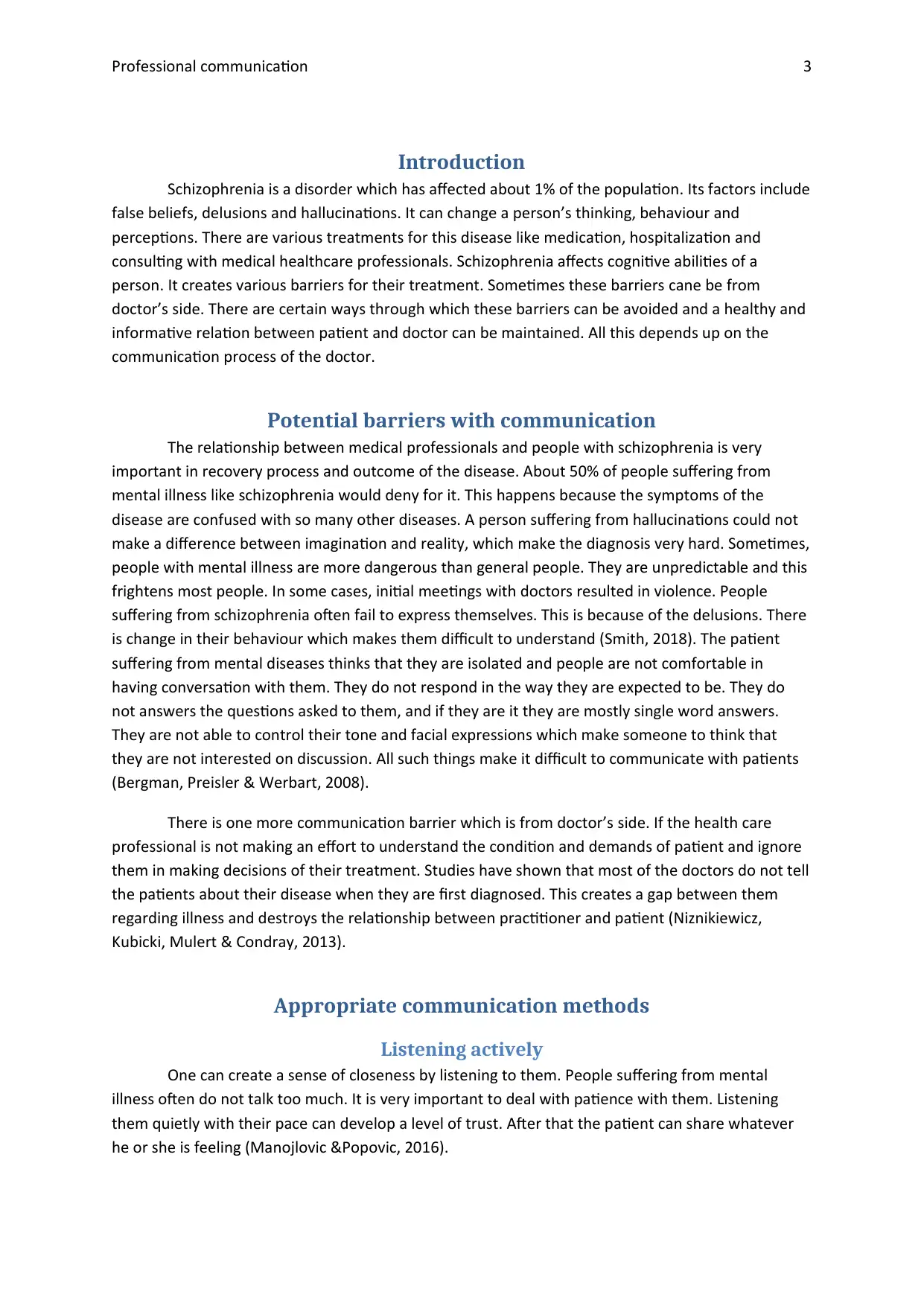
Professional communication 3
Introduction
Schizophrenia is a disorder which has affected about 1% of the population. Its factors include
false beliefs, delusions and hallucinations. It can change a person’s thinking, behaviour and
perceptions. There are various treatments for this disease like medication, hospitalization and
consulting with medical healthcare professionals. Schizophrenia affects cognitive abilities of a
person. It creates various barriers for their treatment. Sometimes these barriers cane be from
doctor’s side. There are certain ways through which these barriers can be avoided and a healthy and
informative relation between patient and doctor can be maintained. All this depends up on the
communication process of the doctor.
Potential barriers with communication
The relationship between medical professionals and people with schizophrenia is very
important in recovery process and outcome of the disease. About 50% of people suffering from
mental illness like schizophrenia would deny for it. This happens because the symptoms of the
disease are confused with so many other diseases. A person suffering from hallucinations could not
make a difference between imagination and reality, which make the diagnosis very hard. Sometimes,
people with mental illness are more dangerous than general people. They are unpredictable and this
frightens most people. In some cases, initial meetings with doctors resulted in violence. People
suffering from schizophrenia often fail to express themselves. This is because of the delusions. There
is change in their behaviour which makes them difficult to understand (Smith, 2018). The patient
suffering from mental diseases thinks that they are isolated and people are not comfortable in
having conversation with them. They do not respond in the way they are expected to be. They do
not answers the questions asked to them, and if they are it they are mostly single word answers.
They are not able to control their tone and facial expressions which make someone to think that
they are not interested on discussion. All such things make it difficult to communicate with patients
(Bergman, Preisler & Werbart, 2008).
There is one more communication barrier which is from doctor’s side. If the health care
professional is not making an effort to understand the condition and demands of patient and ignore
them in making decisions of their treatment. Studies have shown that most of the doctors do not tell
the patients about their disease when they are first diagnosed. This creates a gap between them
regarding illness and destroys the relationship between practitioner and patient (Niznikiewicz,
Kubicki, Mulert & Condray, 2013).
Appropriate communication methods
Listening actively
One can create a sense of closeness by listening to them. People suffering from mental
illness often do not talk too much. It is very important to deal with patience with them. Listening
them quietly with their pace can develop a level of trust. After that the patient can share whatever
he or she is feeling (Manojlovic &Popovic, 2016).
Introduction
Schizophrenia is a disorder which has affected about 1% of the population. Its factors include
false beliefs, delusions and hallucinations. It can change a person’s thinking, behaviour and
perceptions. There are various treatments for this disease like medication, hospitalization and
consulting with medical healthcare professionals. Schizophrenia affects cognitive abilities of a
person. It creates various barriers for their treatment. Sometimes these barriers cane be from
doctor’s side. There are certain ways through which these barriers can be avoided and a healthy and
informative relation between patient and doctor can be maintained. All this depends up on the
communication process of the doctor.
Potential barriers with communication
The relationship between medical professionals and people with schizophrenia is very
important in recovery process and outcome of the disease. About 50% of people suffering from
mental illness like schizophrenia would deny for it. This happens because the symptoms of the
disease are confused with so many other diseases. A person suffering from hallucinations could not
make a difference between imagination and reality, which make the diagnosis very hard. Sometimes,
people with mental illness are more dangerous than general people. They are unpredictable and this
frightens most people. In some cases, initial meetings with doctors resulted in violence. People
suffering from schizophrenia often fail to express themselves. This is because of the delusions. There
is change in their behaviour which makes them difficult to understand (Smith, 2018). The patient
suffering from mental diseases thinks that they are isolated and people are not comfortable in
having conversation with them. They do not respond in the way they are expected to be. They do
not answers the questions asked to them, and if they are it they are mostly single word answers.
They are not able to control their tone and facial expressions which make someone to think that
they are not interested on discussion. All such things make it difficult to communicate with patients
(Bergman, Preisler & Werbart, 2008).
There is one more communication barrier which is from doctor’s side. If the health care
professional is not making an effort to understand the condition and demands of patient and ignore
them in making decisions of their treatment. Studies have shown that most of the doctors do not tell
the patients about their disease when they are first diagnosed. This creates a gap between them
regarding illness and destroys the relationship between practitioner and patient (Niznikiewicz,
Kubicki, Mulert & Condray, 2013).
Appropriate communication methods
Listening actively
One can create a sense of closeness by listening to them. People suffering from mental
illness often do not talk too much. It is very important to deal with patience with them. Listening
them quietly with their pace can develop a level of trust. After that the patient can share whatever
he or she is feeling (Manojlovic &Popovic, 2016).
Secure Best Marks with AI Grader
Need help grading? Try our AI Grader for instant feedback on your assignments.
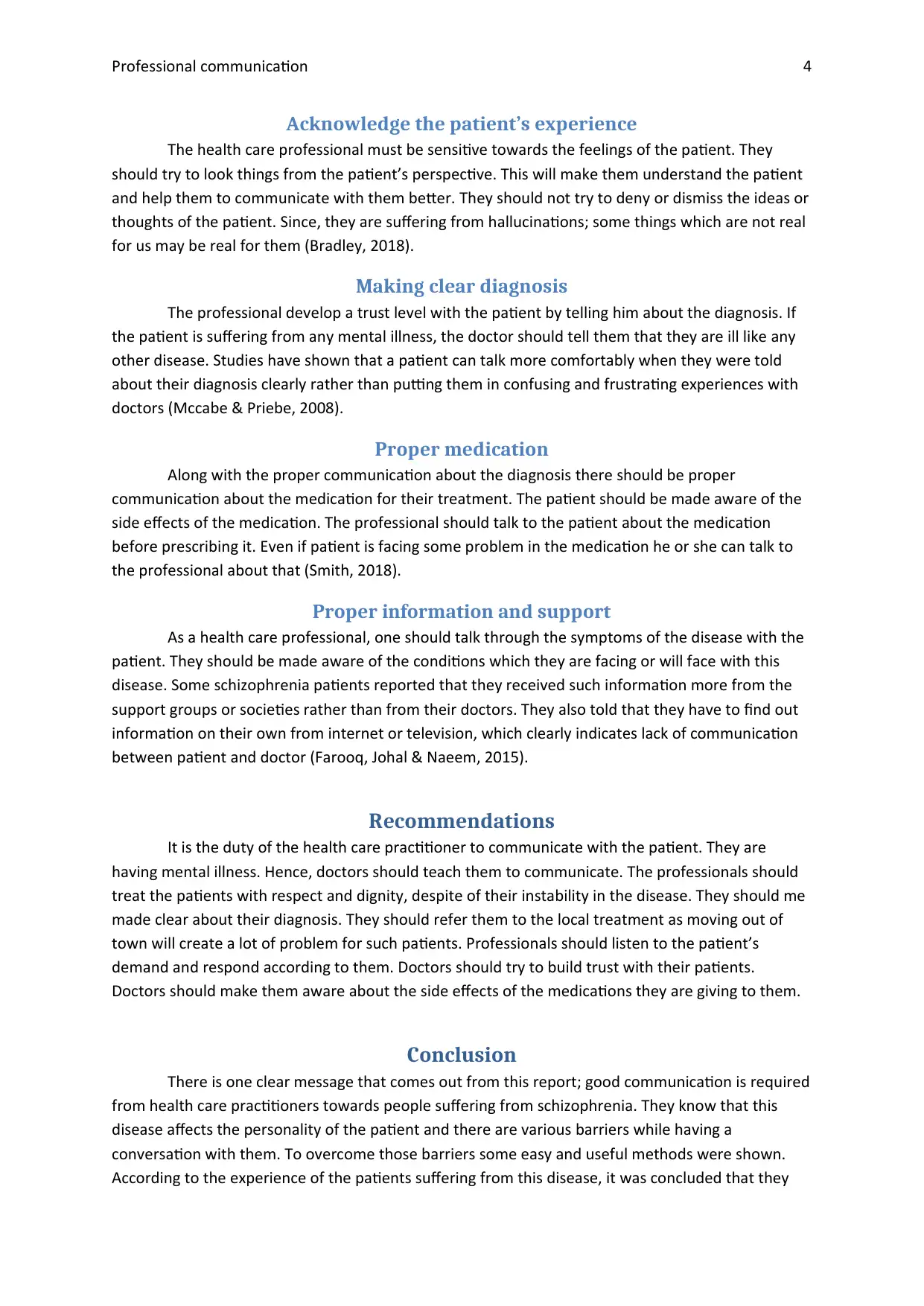
Professional communication 4
Acknowledge the patient’s experience
The health care professional must be sensitive towards the feelings of the patient. They
should try to look things from the patient’s perspective. This will make them understand the patient
and help them to communicate with them better. They should not try to deny or dismiss the ideas or
thoughts of the patient. Since, they are suffering from hallucinations; some things which are not real
for us may be real for them (Bradley, 2018).
Making clear diagnosis
The professional develop a trust level with the patient by telling him about the diagnosis. If
the patient is suffering from any mental illness, the doctor should tell them that they are ill like any
other disease. Studies have shown that a patient can talk more comfortably when they were told
about their diagnosis clearly rather than putting them in confusing and frustrating experiences with
doctors (Mccabe & Priebe, 2008).
Proper medication
Along with the proper communication about the diagnosis there should be proper
communication about the medication for their treatment. The patient should be made aware of the
side effects of the medication. The professional should talk to the patient about the medication
before prescribing it. Even if patient is facing some problem in the medication he or she can talk to
the professional about that (Smith, 2018).
Proper information and support
As a health care professional, one should talk through the symptoms of the disease with the
patient. They should be made aware of the conditions which they are facing or will face with this
disease. Some schizophrenia patients reported that they received such information more from the
support groups or societies rather than from their doctors. They also told that they have to find out
information on their own from internet or television, which clearly indicates lack of communication
between patient and doctor (Farooq, Johal & Naeem, 2015).
Recommendations
It is the duty of the health care practitioner to communicate with the patient. They are
having mental illness. Hence, doctors should teach them to communicate. The professionals should
treat the patients with respect and dignity, despite of their instability in the disease. They should me
made clear about their diagnosis. They should refer them to the local treatment as moving out of
town will create a lot of problem for such patients. Professionals should listen to the patient’s
demand and respond according to them. Doctors should try to build trust with their patients.
Doctors should make them aware about the side effects of the medications they are giving to them.
Conclusion
There is one clear message that comes out from this report; good communication is required
from health care practitioners towards people suffering from schizophrenia. They know that this
disease affects the personality of the patient and there are various barriers while having a
conversation with them. To overcome those barriers some easy and useful methods were shown.
According to the experience of the patients suffering from this disease, it was concluded that they
Acknowledge the patient’s experience
The health care professional must be sensitive towards the feelings of the patient. They
should try to look things from the patient’s perspective. This will make them understand the patient
and help them to communicate with them better. They should not try to deny or dismiss the ideas or
thoughts of the patient. Since, they are suffering from hallucinations; some things which are not real
for us may be real for them (Bradley, 2018).
Making clear diagnosis
The professional develop a trust level with the patient by telling him about the diagnosis. If
the patient is suffering from any mental illness, the doctor should tell them that they are ill like any
other disease. Studies have shown that a patient can talk more comfortably when they were told
about their diagnosis clearly rather than putting them in confusing and frustrating experiences with
doctors (Mccabe & Priebe, 2008).
Proper medication
Along with the proper communication about the diagnosis there should be proper
communication about the medication for their treatment. The patient should be made aware of the
side effects of the medication. The professional should talk to the patient about the medication
before prescribing it. Even if patient is facing some problem in the medication he or she can talk to
the professional about that (Smith, 2018).
Proper information and support
As a health care professional, one should talk through the symptoms of the disease with the
patient. They should be made aware of the conditions which they are facing or will face with this
disease. Some schizophrenia patients reported that they received such information more from the
support groups or societies rather than from their doctors. They also told that they have to find out
information on their own from internet or television, which clearly indicates lack of communication
between patient and doctor (Farooq, Johal & Naeem, 2015).
Recommendations
It is the duty of the health care practitioner to communicate with the patient. They are
having mental illness. Hence, doctors should teach them to communicate. The professionals should
treat the patients with respect and dignity, despite of their instability in the disease. They should me
made clear about their diagnosis. They should refer them to the local treatment as moving out of
town will create a lot of problem for such patients. Professionals should listen to the patient’s
demand and respond according to them. Doctors should try to build trust with their patients.
Doctors should make them aware about the side effects of the medications they are giving to them.
Conclusion
There is one clear message that comes out from this report; good communication is required
from health care practitioners towards people suffering from schizophrenia. They know that this
disease affects the personality of the patient and there are various barriers while having a
conversation with them. To overcome those barriers some easy and useful methods were shown.
According to the experience of the patients suffering from this disease, it was concluded that they

Professional communication 5
want to be treated like human beings with dignity and respect. They also want their doctor to be
honest with them and to communicate with them on each and every aspect of this disease. Some
other recommendations were made to help out the professionals, which they can follow to gain the
trust of mental patients.
want to be treated like human beings with dignity and respect. They also want their doctor to be
honest with them and to communicate with them on each and every aspect of this disease. Some
other recommendations were made to help out the professionals, which they can follow to gain the
trust of mental patients.
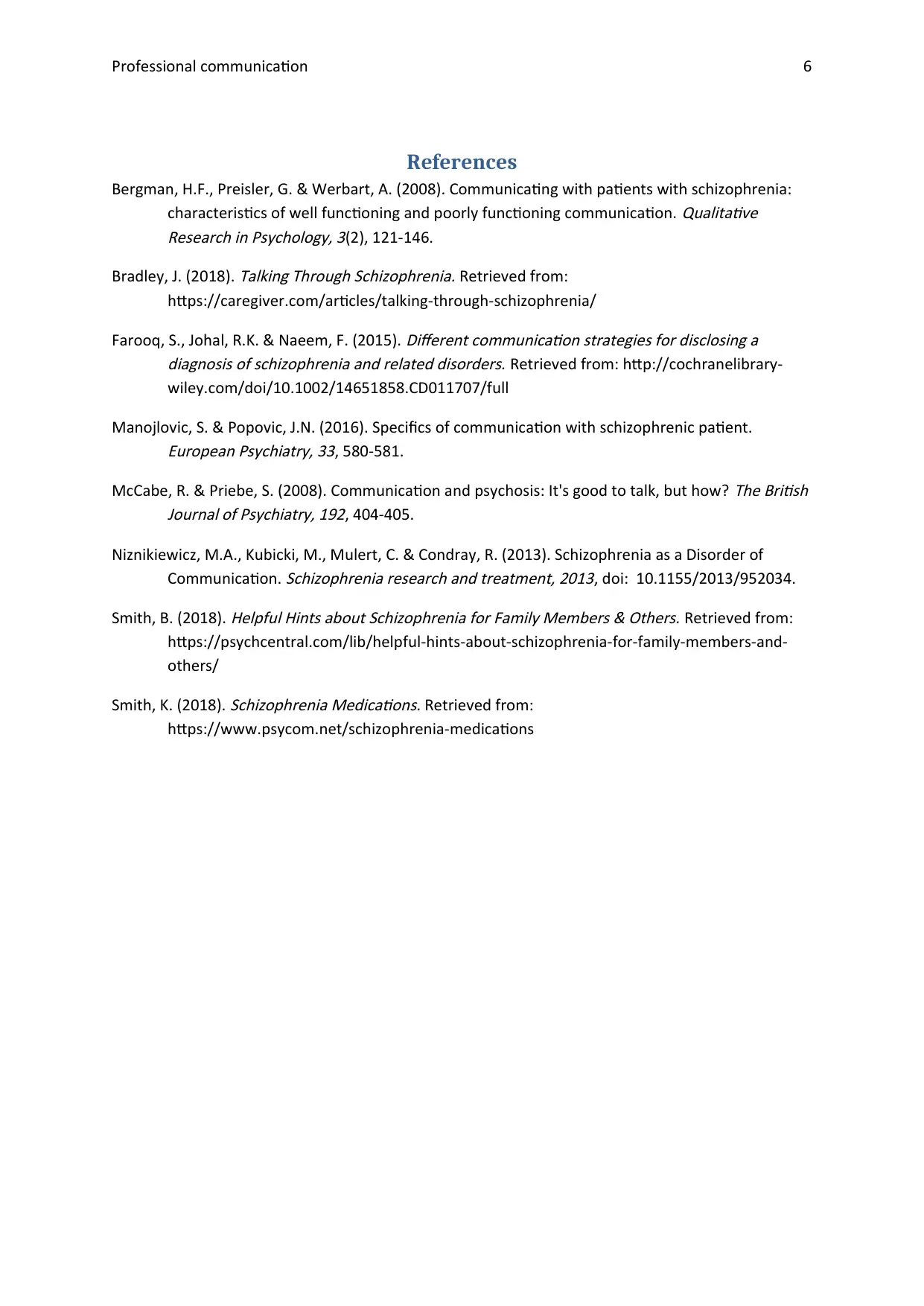
Professional communication 6
References
Bergman, H.F., Preisler, G. & Werbart, A. (2008). Communicating with patients with schizophrenia:
characteristics of well functioning and poorly functioning communication.
Qualitative
Research in Psychology, 3(2), 121-146.
Bradley, J. (2018).
Talking Through Schizophrenia. Retrieved from:
https://caregiver.com/articles/talking-through-schizophrenia/
Farooq, S., Johal, R.K. & Naeem, F. (2015).
Different communication strategies for disclosing a
diagnosis of schizophrenia and related disorders. Retrieved from: http://cochranelibrary-
wiley.com/doi/10.1002/14651858.CD011707/full
Manojlovic, S. & Popovic, J.N. (2016). Specifics of communication with schizophrenic patient.
European Psychiatry, 33, 580-581.
McCabe, R. & Priebe, S. (2008). Communication and psychosis: It's good to talk, but how?
The British
Journal of Psychiatry, 192, 404-405.
Niznikiewicz, M.A., Kubicki, M., Mulert, C. & Condray, R. (2013). Schizophrenia as a Disorder of
Communication.
Schizophrenia research and treatment, 2013, doi: 10.1155/2013/952034.
Smith, B. (2018).
Helpful Hints about Schizophrenia for Family Members & Others. Retrieved from:
https://psychcentral.com/lib/helpful-hints-about-schizophrenia-for-family-members-and-
others/
Smith, K. (2018).
Schizophrenia Medications. Retrieved from:
https://www.psycom.net/schizophrenia-medications
References
Bergman, H.F., Preisler, G. & Werbart, A. (2008). Communicating with patients with schizophrenia:
characteristics of well functioning and poorly functioning communication.
Qualitative
Research in Psychology, 3(2), 121-146.
Bradley, J. (2018).
Talking Through Schizophrenia. Retrieved from:
https://caregiver.com/articles/talking-through-schizophrenia/
Farooq, S., Johal, R.K. & Naeem, F. (2015).
Different communication strategies for disclosing a
diagnosis of schizophrenia and related disorders. Retrieved from: http://cochranelibrary-
wiley.com/doi/10.1002/14651858.CD011707/full
Manojlovic, S. & Popovic, J.N. (2016). Specifics of communication with schizophrenic patient.
European Psychiatry, 33, 580-581.
McCabe, R. & Priebe, S. (2008). Communication and psychosis: It's good to talk, but how?
The British
Journal of Psychiatry, 192, 404-405.
Niznikiewicz, M.A., Kubicki, M., Mulert, C. & Condray, R. (2013). Schizophrenia as a Disorder of
Communication.
Schizophrenia research and treatment, 2013, doi: 10.1155/2013/952034.
Smith, B. (2018).
Helpful Hints about Schizophrenia for Family Members & Others. Retrieved from:
https://psychcentral.com/lib/helpful-hints-about-schizophrenia-for-family-members-and-
others/
Smith, K. (2018).
Schizophrenia Medications. Retrieved from:
https://www.psycom.net/schizophrenia-medications
1 out of 7
Related Documents
Your All-in-One AI-Powered Toolkit for Academic Success.
+13062052269
info@desklib.com
Available 24*7 on WhatsApp / Email
![[object Object]](/_next/static/media/star-bottom.7253800d.svg)
Unlock your academic potential
© 2024 | Zucol Services PVT LTD | All rights reserved.





